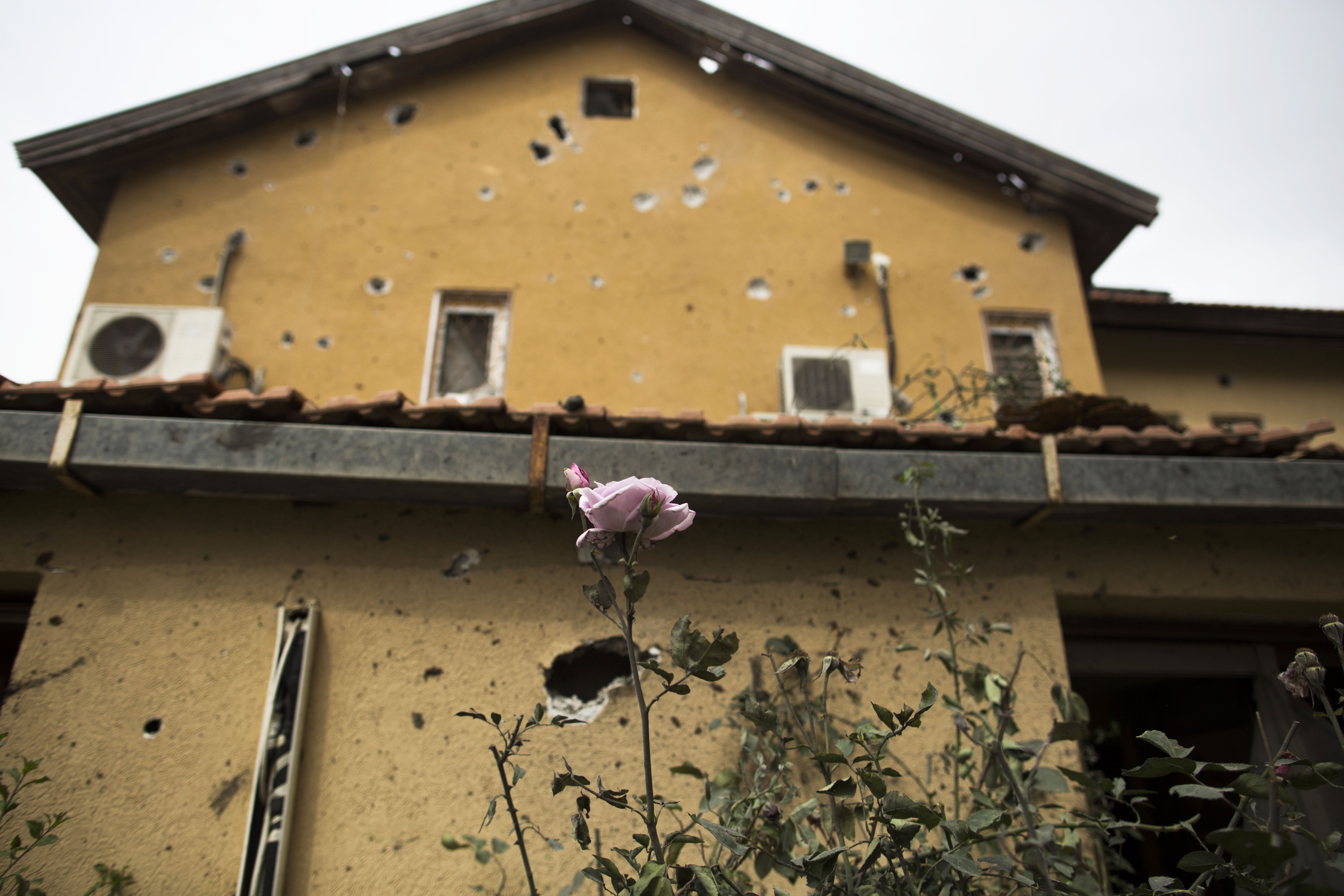 A house that was damaged by a rocket strike from the Gaza Strip on May 6, 2019 in Ashkelon, Israel. Palestinian leaders in Gaza agreed a ceasefire with Israel on today to end a deadly two-day escalation in violence that threatened to widen into war. (Photo by Lior Mizrahi/Getty Images)
A house that was damaged by a rocket strike from the Gaza Strip on May 6, 2019 in Ashkelon, Israel. Palestinian leaders in Gaza agreed a ceasefire with Israel on today to end a deadly two-day escalation in violence that threatened to widen into war. (Photo by Lior Mizrahi/Getty Images) I’ve never liked the word “deterrence.” It sounds so dry and lifeless compared to the dramatic idea it signifies, which is: “I’m scared as hell to attack you because of what you may do to me.”
The proper dictionary definition is: “The act of discouraging an action or event through instilling doubt or fear of the consequences.”
For decades, Israel has survived by “instilling doubt or fear of the consequences” in its enemies. Every military accomplishment has served to “deter” the enemy from further aggression, lest they experience Israel’s wrath anew.
When you visit Israel and you see this vibrant, creative, noisy and argumentative society fully engaged with life, that is deterrence in action.
Yes, Hezbollah may have 100,000 missiles pointed right at that vibrant world, but they surely remember the suffering they experienced 13 years ago during the Second Lebanon War — which may explain why the Lebanese front has been relatively quiet for so long.
But for all the power of deterrence, it can only go so far. Suicide bombers, for example, are impossible to deter as they’re more than willing to give up their lives in order to kill you.
Then there are terrorist leaders who hide behind civilians in order to deter you from attacking them. This has been the case in Gaza, where terror groups like Hamas and Palestinian Islamic Jihad (PIJ) have been notoriously difficult to deter as they’re routinely willing to sacrifice the lives of their people.
When so many rockets are falling on Israel, as they are now, and much of the population is on edge, keenly aware of the nearest bomb shelter, the question that inevitably hangs in the air is: Are they not afraid of us? Can’t we deter them?
Ironically, this latest wave of rockets from Gaza came in the wake of a targeted attempt at deterrence — the killing of a PIJ terrorist leader who sends others to their deaths but who himself would prefer to live. By targeting leaders who make war decisions, this thinking goes, maybe other leaders will be deterred.
When you visit Israel and you see this vibrant, creative, noisy and argumentative society fully engaged with life, that is deterrence in action.
It’s good logic, but deterrence works both ways. The terrorist leaders who are retaliating with rockets also want to deter Israel from killing more of them, so they are trying to establish their own consequences. They know that an Israeli society terrified of incoming rockets is a serious consequence.
So, who will win this latest war of deterrence?
As I write this late Tuesday, we’re at the nervous stage. This is what I’m reading now on JPost: “Israel is bracing for continued violence as it carried out three waves of retaliatory strikes after the country was pounded by some 150 rockets on Tuesday morning following the predawn targeted killing of Palestinian Islamic Jihad (PIJ) leader Baha Abu Al-Ata in the Gaza Strip.”
By the time you read this column, it’s possible that things will have gotten out of hand, or even that things will have calmed down. If you’re wondering why the “war” is not on our cover page, that’s because that page goes to the printer a day early — which means it was already printed by the time we got news of these latest attacks.
By sheer coincidence, our cover story this week still deals with Israel. We had another one in mind, until I met my friend Noam Weissman last Friday, who told me about an initiative to make November “Jewish History Month.” So we decided to run with that cover story.
If there needs to be a fear of consequences in the region, let it be with those for whom murdering Jews and destroying Israel is a holy and lifetime mission.
It turns out that five defining events in Israel’s history occurred during the month of November: the Balfour Declaration (1917), the United Nations Partition vote (1947), the U.N. “Zionism Is Racism” resolution (1975), Operation Moses (1984) and the assassination of Prime Minister Yitzhak Rabin (1995).
It would indeed be tragic if this latest confrontation ends up becoming another major November event.
So, let’s hope that the terrorists will be deterred. Let’s also hope that other genocidal threats in the area, especially the predatory Iranian regime, will also be deterred by Israel’s aggressive preemptive moves over the past few years.
If there needs to be a fear of consequences in the region, let it be with those for whom murdering Jews and destroying Israel is a holy and lifetime mission.























 More news and opinions than at a Shabbat dinner, right in your inbox.
More news and opinions than at a Shabbat dinner, right in your inbox.